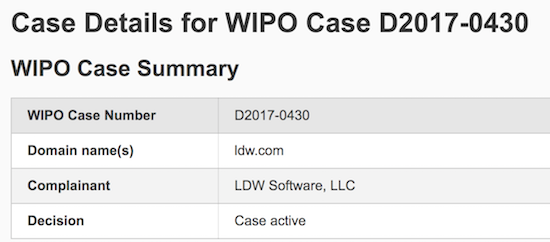
A UDRP has been filed against LDW.com, a valuable three letter .com domain. The UDRP was filed at the World Intellectual Property Organization (WIPO), and it is WIPO case #D2017-0430. The complainant in this case is listed as LDW Software, LLC.
LDW.com is currently registered to a domain registrant with an address in China. From a DomainTools Whois History search, it looks like this registrant has owned the domain name since August of 2015. Prior to that, the domain name was briefly registered to a Gmail address, and it was privately registered prior to that.
Up through mid-2014, it looks like LDW Software owned the domain name, although a privacy service blocks everything but the registrant name. Archive.org shows the LDW Software website operating through at least July of 2016.
Interestingly, the Gmail address I see in the 2015 DomainTools archived Whois record contains the name of the Administrative contact for LDW Software from 2006.
I have no idea what happened with this domain name, but it will be interesting to see if there is some sort of internal dispute or if the company otherwise lost control of the domain name somehow. LDW.com is obviously a high value domain name. In fact, Estibot pegs its value at $67,000.
I will update this when the UDRP decision is published.
Update: The UDRP decision was published, and the domain name was awarded to the complainant. As mentioned by John Berryhill in the comment section and reported by Andrew Allemann, the domain name was stolen from the owners, so the UDRP proceeding enabled the owner to reclaim the domain name. The complainant was represented by Doug Isenberg of The GigaLaw Firm.



It looks like a stolen name.
The WHOIS changed from the principal of the Complainant to another registrant in 2015. The domain name, however, kept resolving to the Complainant’s site well into 2016.
They probably didn’t notice the WHOIS change until the name abruptly stopped resolving.
Easy complainant win. The UDRP can be used to recover stolen names, so long as the name corresponds to a trademark of the complainant. In this instance, it’s pretty clear that LDW was using an “LDW” mark from historical screenshots of their site. Once you get past the trademark issue, then legitimate rights and bad faith registration both more or less roll into “the respondent stole the name”.